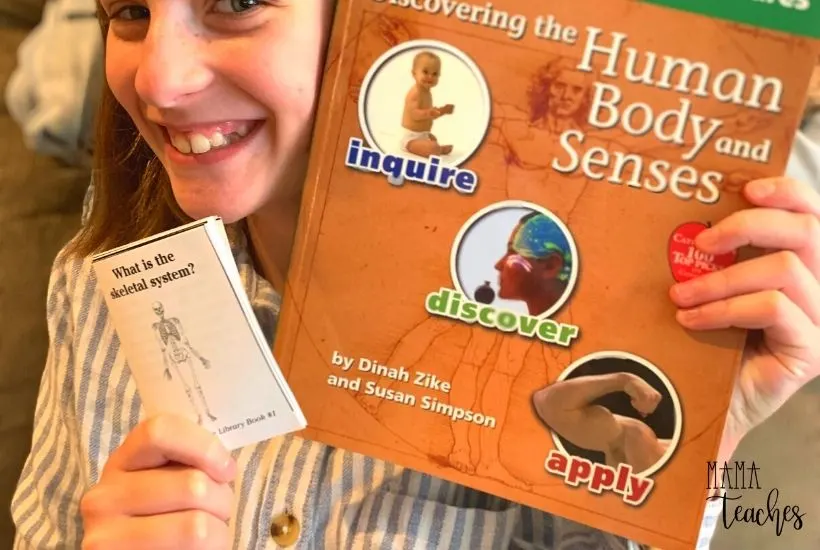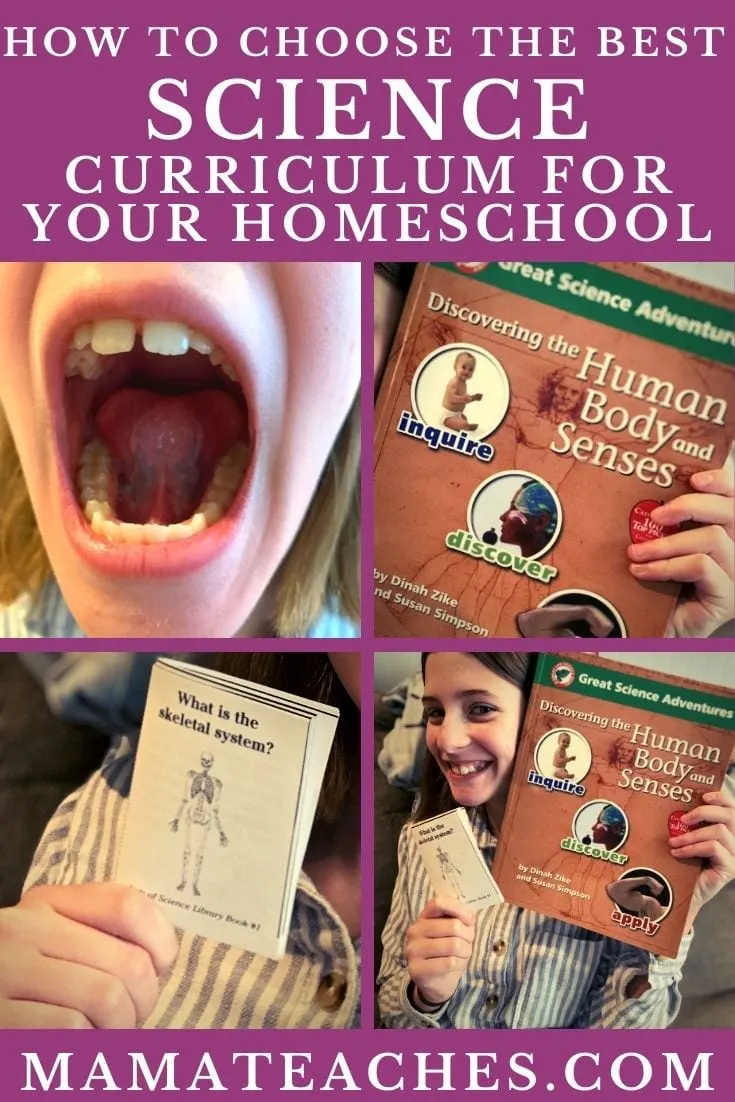Looking for a homeschool science curriculum?
Here’s what you need to consider.

This article contains affiliate links to things that you might like.
Talking about homeschool science curriculums is exciting for me because science is my favorite to teach!
The thrill of getting to make a mess in the name of knowledge, as well as, finding out exactly how things operate is something that just can’t be done with other subjects.
Unfortunately, there’s not a lot of information on what to look for in a homeschool science curriculum, so I thought I’d provide a bit of guidance based on our experience and what has worked well for our kids.
The key to making children passionate about learning is to let them have fun.
Science is no different.
With these tips, you’ll be better able to find a solid homeschool science curriculum that will not only help your kids learn but will instill in them a love for all things science-related.
How to Choose a Homeschool Science Curriculum
We were given the opportunity to work with one of our very favorite resources for homeschool science curriculums, Common Sense Press, so I’m going to be sharing examples of them in the points below.
I think it’s always important to understand what different curriculums bring to the table, so I hope this gives you a guide as to what makes some companies and science programs excellent and what might be some red flags when you’re looking.
Does the Curriculum Have Samples?
It is always a good idea to look into sample lessons or plans before getting any sort of curriculum.
Most sites offer printable samples of the material that you can look over to decide if that program will work.
In Common Sense Press’ Great Science Adventures series, each of the 10 books provides a sample lesson.
One of our very favorite lessons in the Discovering the Human Body and Senses book was creating a mini-book about the skeletal system.
You can actually try out that lesson in their free sample of the curriculum!
(I admit that I even reviewed the mini-book when I was working on my anatomy final for my yoga teacher training class!)
My advice would be to seek these samples out in the science curriculum that you’re interested in and really look through them to decide if they’ll be a good fit for your family.
Can you dedicate enough time to them?
Is it alluring enough to draw your child in?
Think carefully about it as you do your research.
Are There Interactive Activities?
Children need to be engaged in order to properly focus their attention on the topic at hand.
Science curriculums that are interactive, fun, and user friendly will keep your child attentive as well as intrigued.
While I am always a huge fan of science experiments, it’s important to find science curriculums that rely on other hands-on activities as well.
Let’s face it, we don’t have time (or energy!) to do grand experiments every day!
In the Discovering the Human Body and Senses curriculum that I mentioned above, that are activities that are super simple to prepare yet are super engaging.
It’s a win-win. One of our favorites?
Looking at the blood vessels under our tongues.
Weird, I know, but it was so much fun to examine them in the mirror.
Remember, the activities don’t have to be grandiose to make a huge impact!
You can also find programs that come with quizzes and other options to track your child’s progress if having that “testing” component is important to you.
Will There Be Virtual Labs Included with the Curriculum?
Virtual labs are especially important for high school science curriculums.
They’re not typically a component of elementary or middle school programs because a lot of the materials and topics are easy enough to experiment with at home.
However, for high school science, those virtual labs can be a lifesaver – not to mention money-saver!
If they are important to you, look for ones that are easy to understand, easy to use, and easy to access.
I’m always a fan of a hands-on experiment but these virtual labs are a great way to get in those biology and chemistry experiment that high schoolers need.
Is the Science Curriculum Age-Appropriate?
Age-appropriateness should be considered when you look at any curriculum – not just science.
You absolutely must find a program that is conducive to your child’s age, grade, and background knowledge of science.
Under-stimulating an advanced learner leads to boredom or fizzling out, whereas overstimulating a child struggling in certain areas will cause lack of engagement and feelings of inadequacy.
Avoid either extreme as much as possible by breaking down the usability of the program you’re considering.
Elementary science should be about exposure to science topics and getting students excited about the things that science can do and is responsible for.
Middle school will be a bit more demanding, requiring a bit more research.
High school is even more involved, but it should still engage your child.
If you’re teaching multiple grades like I did, it’s also important to find a homeschool science curriculum that spans multiple grades.
That was one of the huge reasons why we went with Common Sense Press’ Great Science Adventures curriculum.
Each of the 10 books provides 24 lessons that are designed to be used with multiple ages (K-8).
That means your first grader and your fifth grader can do the exact same curriculum and both of them will be engaged and learning.
Hallelujah!
Does the Science Curriculum Come with a Kit for Experiments?
I think we can all agree the best part of science is making a mess, trying safe explosions, and the wonder of creating.
If having a kit is important to you (or necessary for higher level science curriculums) look for one that is well-stocked, easy to use, and gives clear instructions on what to do and how to do it

In my experience homeschooling, having a science kit was never really necessary.
All of the supplies that we needed were common household items or were very easy to find at hardware and grocery stores.
In fact, one of the keys to the perfect homeschool science curriculum for us was a program that only used items that we could easily source for experiments.
For example, in The World of Tools and Technology, one of the Great Science Adventures books, there’s an experiment to make a lever.
I don’t need a kit for that!
The materials are listed in the lesson and super easy to find which makes my life as a busy, work-from-home, homeschooling mom so.much.easier.
Share your thoughts!
What do you find important in a Homeschool Science Curriculum?
What has worked for you?
Comment below to help others find a Science program that works for them!
Check out Great Science Adventures Homeschool Science Curriculum
And, if you’d like to check out the Great Science Adventures curriculum that we used and loved, you can find out more about it on the Common Sense Press website.
You can also enter below for a chance to win one set of the language arts curriculum and one Great Science Adventure!
If you’d like to order your own copies of their homeschool science curriculum you can get 15% off until August 31, 2020 with the code Summer2020.

